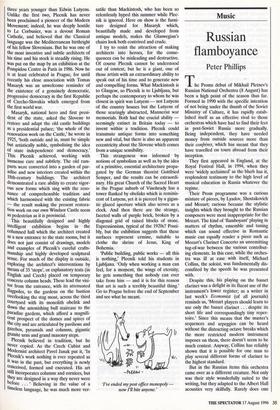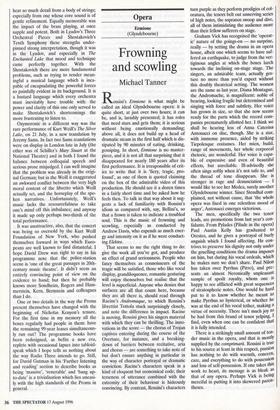Mu sic
Russian flamboyance
Peter Phillips
The Proms debut of Mikhail Pletnev's Russian National Orchestra (8 August) has been a high point of the season thus far. Formed in 1990 with the specific intention of not being under the thumb of the Soviet Ministry of Culture, it has rapidly estab- lished itself as an effective rival to those orchestras which have had to fmd their feet in post-Soviet Russia more gradually. Being independent, they have needed money from outside sources more than their conjUres, which has meant that they have travelled on tours abroad from their inception.
They first appeared in England, at the Royal Festival Hall, in 1994, when they were 'widely acclaimed' as the blurb has it, resplendent testimony to the high level of musical education in Russia whatever the regime.
Their Prom programme was a curious mixture of pieces, by Lyadov, Shostakovich and Mozart; curious because the stylistic insights which they brought to the Russian composers were most inappropriate for the Mozart. The kind of 'flamboyant' playing in matters of rhythm, ensemble and tuning which can sound effective in Romantic music can equally render a piece such as Mozart's Clarinet Concerto an unremitting tug-of-war between the various contribut- ing elements. In this case, while the orches- tra was ill at ease with itself, Michael Collins, the soloist, was fundamentally dis- comfited by the speeds he was presented with.
Despite this, his playing on the basset clarinet was a delight in its fluent use of the instrument's lower register; as a writer in last week's Economist (of all journals) reminds us, 'Mozart players should learn to use only the basset clarinet . .. despite its short life and correspondingly tiny reper- toire.' Since this means that the master's sequences and arpeggios can be heard without the distracting octave breaks which the more restricted modern instrument imposes on them, there doesn't seem to be much contest. Anyway, Collins has reliably shown that it is possible for one man to play several different forms of clarinet to the highest standard.
But in the Russian items this orchestra came over as a different creature. Not only was their style wonderfully suited to the writing, but they adapted to the Albert Hall acoustics very skilfully. Rarely does one hear so much detail from a body of strings; especially from one whose core sound is of gentle refinement. Equally memorable was the impact of the brass playing, at once supple and potent. Both in Lyadov's Three Orchestral Pieces and Shostakovich's Tenth Symphony these strengths under- pinned strong interpretation, though it was in the Lyadov, and especially in The Enchanted Lake that mood and technique came perfectly together. With the Shostakovich there are more fundamental problems, such as trying to render mean- ingful a musical language which is inca- pable of encapsulating the powerful forces so painfully evident in its background. It is a bastard language which every orchestra must inevitably have trouble with: the power and clarity of this one only served to make Shostakovich's shortcomings the more frustrating to listen to.
Oxymoronic in a different way was the rare performance of Kurt Weill's The Silver Lake, on 21 July, in a new translation by Jeremy Sams. In fact two Sams translations were on display in London late in July (the other was of Schiller's Mary Stuart at the National Theatre) and in both I found the balance between colloquial speech and serious prose misjudged. I can well imagine that the problem was already in the origi- nal German; but in the Weill it exaggerated an awkward conflict between the very high moral content of the libretto which Well actually set, and the horseplay of the spo- ken narratives. Unfortunately, Weill's music lacks the resourcefulness to take one's mind off this imbalance; and anyway it made up only perhaps two-thirds of the total performance.
It was unattractive, also, that the concert was being so oversold by the Kurt Weill Foundation of New York, who pushed themselves forward in ways which Euro- peans are well known to find distasteful. I hope David Drew was right to say in his programme note that the police-station scene is 'one of the great passages in 20th- century music theatre'. It didn't seem an entirely convincing point of view on the evidence to hand; but then he probably knows more Sondheim, Rogers and Ham- merstein, Kern, Bernstein and colleagues than I do.
One or two details in the way the Proms present themselves have changed with the beginning of Nicholas Kenyon's tenure. For the first time in my memory all the boxes regularly had people in them: have the remaining 99-year leases simultaneous- ly run out? The programme books have been redesigned, as befits a new era, replete with occasional lapses into tabloid- speak which I hope tells us nothing about the way Radio Three intends to go. Still, for David Gutman in his 'Further listening and reading' section to describe books as being 'massive', 'venerable' and 'bang up- to-date' is a trivialisation which lies uneasi- ly with the high standards of the Proms in general.



















































 Previous page
Previous page